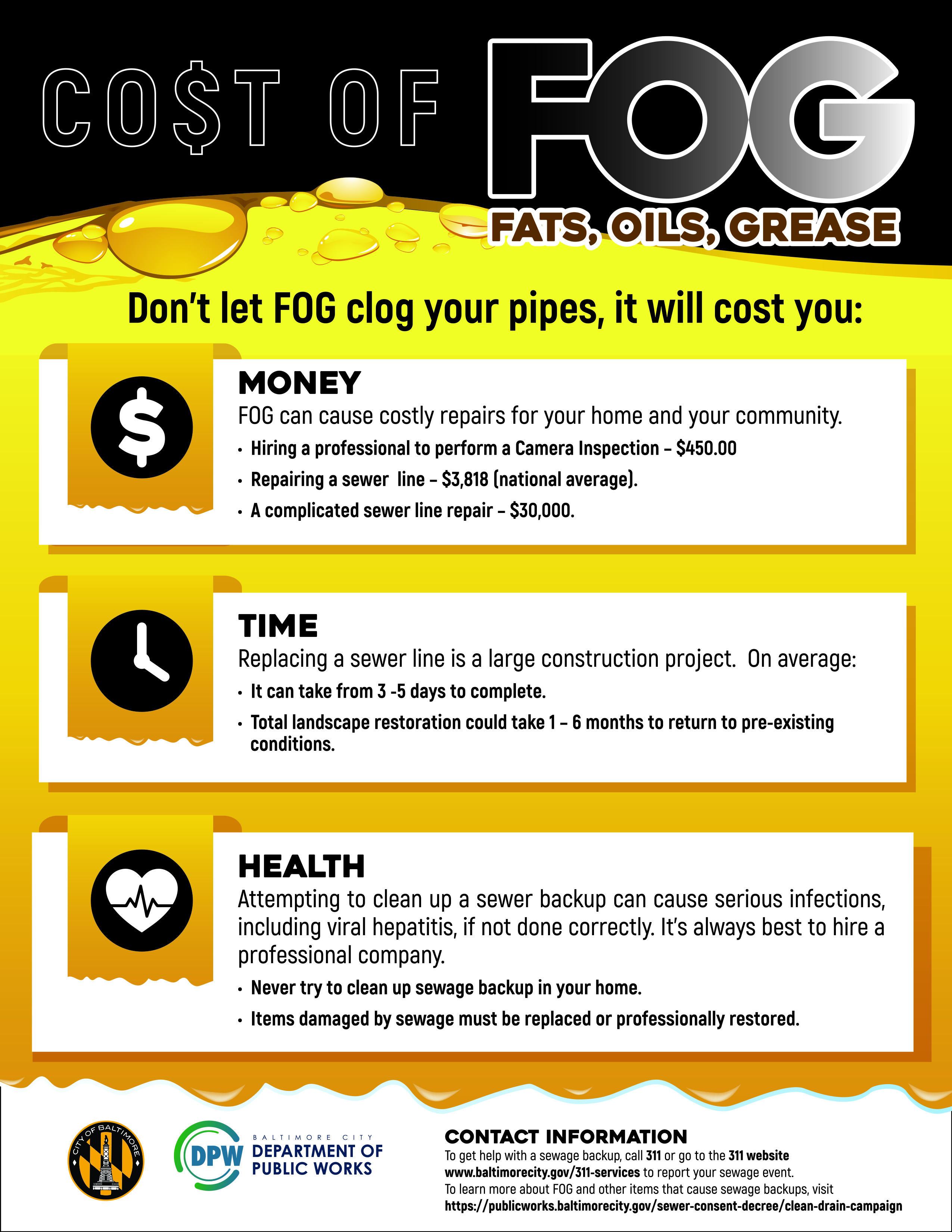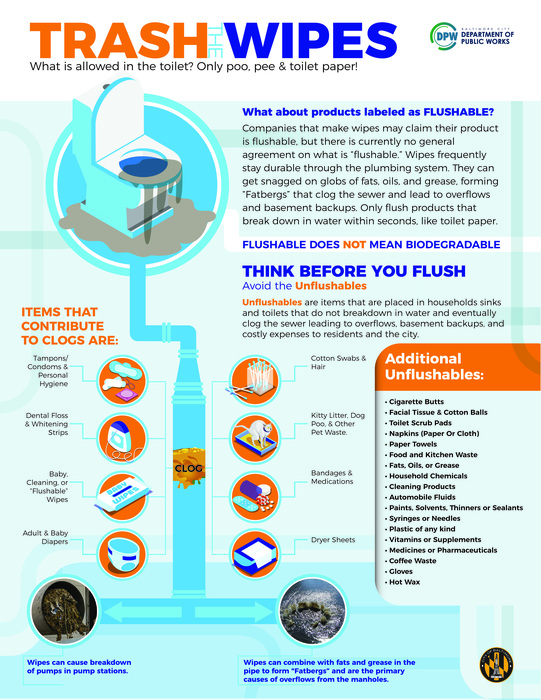Clean Drain Campaign
Prevent sewer clogs and sewer backups
What are you sending down the drain? Things like cooking fats, oils, grease, wet wipes (flushable wipes), and household waste don’t belong in the sewer. Throw these things out in your trash instead of flushing down a toilet or sink drain.
The Clean Drain Campaign is an initiative from the Baltimore City Department of Public Works. We are raising awareness about how to dispose of items that can clog residential sewer lines, and create fatbergs in our public sewer mains.
What’s a fatberg?
A fatberg is a disgusting and sewer-clogging glob that is a mix of wet wipes (so-called ‘flushable wipes’) and fats, oils and grease. It all pastes together in a giant greasy clump, and overflows and sewer backups are the result.
Are flushable wipes really flushable?
No, they are not flushable! These wipes can enter the sewer system where they clump up and block sewers. A blocked sewer means a backup, and you don't want the backup to be at your home! Wipes can also cause breakdown of pumps in the pump stations.
Watch: Are flushable wipes really flushable?
Source: Today Show
When you properly dispose of wipes by putting them in the trash can instead of a toilet or sink drain, you can reduce clogs and help eliminate sewage backups in our basement and streets, and pollution in our waterways and the Chesapeake Bay.
Remember, even if it says ‘Flushable’ or ‘Septic-Safe,’ you can keep your sewer safe by putting these items in the trash, not down a drain.
Get rid of fats, oils and grease the right way
Fats, Oils and Grease (FOG) come from preparing food and kitchen clean-up. FOG may look like liquid when drained, but it gets solid again by the time it gets to the sanitary sewer. This results in clogged drains, sewage backups and the discharge of raw sewage into our local waterways.

FOG myths and facts
| Myth | Fact |
|---|---|
| I can pour grease down the drain if I run hot water with it. | Grease poured down the drain, even with hot water, will cool and get solid again in the sewer pipe. |
| I can scrape kitchen waste down the drain if l use the garbage disposal. | The garbage disposal only grinds up items before discharging them to the sewer system but does not eliminate FOG. |
| Pouring grease down the drain with dish soap will completely dissolve the grease. | Most dish soaps break up grease, but once cooled, the grease will get solid again in the sewer system. |
| I can discard grease in my tub, shower, or toilet. | FOG poured in a bathtub, shower, or toilet end up in the same sewer system that the sink drains to and may cause damage. |
What you can do to stop FOG
- Wipe food and grease from dishes before washing them in the sink.
- Scrape food scraps into a garbage can or compost bin.
- Pour all grease and cooking oil into a covered container and dispose of it in the garbage.
- Clean grease with absorbent materials, like paper towels, and then throw the material in the garbage.
Download: Clear the Fog
The costs of FOG

Don't let FOG clog your pipes, it will cost you:
Money
- FOG can cause costly repairs for your home and your community.
- Hiring a professional to perform a camera inspection: $450.00.
- Repairing a sewer line: $3,818 (national average).
- A complicated sewer line repair: $30,000.
Time
- Replacing a sewer line is a large construction project.
- It can take from 3 to 5 days to complete.
- Total landscape restoration could take 1 to 6 months to return to what it looked like before.
Health risks
- Attempting to clean up a sewer backup can cause serious infections, including viral hepatitis, if not done correctly. It's always best to hire a professional company.
- Never try to clean up a sewage backup in your home.
- Items damaged by sewage must be replaced or professionally restored.
Think before you flush!

What is allowed in the toilet? Only poop, pee and toilet paper!
What about products labeled as flushable or septic-safe? Companies that make these wipes may claim their product is flushable. There is currently no general agreement on what is truly flushable. Wipes frequently stay whole through the plumbing system. They don’t break down into smaller bits over time.
Wipes can get snagged on globs of fats, oils and grease, forming Fatbergs that clog the sewer and lead to overflows and basement backups.
Only flush products that break down in water within a few seconds, like toilet paper.
Avoid the unflushables
Unflushables are items that do not break down in water and eventually clog the sewer.
Don’t flush these:
| Adult and baby diapers | Automobile fluids | Baby cleaning or flushable wipes |
| Bandages | Butter and margarine | Cigarette butts |
| Cleaning products | Coffee grounds or filters | Cotton balls or swabs |
| Dairy products | Dental floss | Dog poo and other pet waste |
| Dryer sheets | Egg shells | Facial tissue |
| Fats, oils or grease | Flour | Food and kitchen waste |
| Gloves | Hair | Hot wax |
| Household chemicals | Kitty litter | Medicine or pharmaceuticals |
| Napkins (paper or cloth) | Paints, solvents, thinners or sealants | Paper towels |
| Pasta or rice | Plastic of any kind | Produce stickers |
| Sauces and salad dressings | Syringes or needles | Tampons, condoms or personal care products |
| Teeth whitening strips | Toilet scrub pads | Vitamins or supplements |
Questions or concerns?
We're here to help. Please call 311 or visit 311 online to connect with us.
